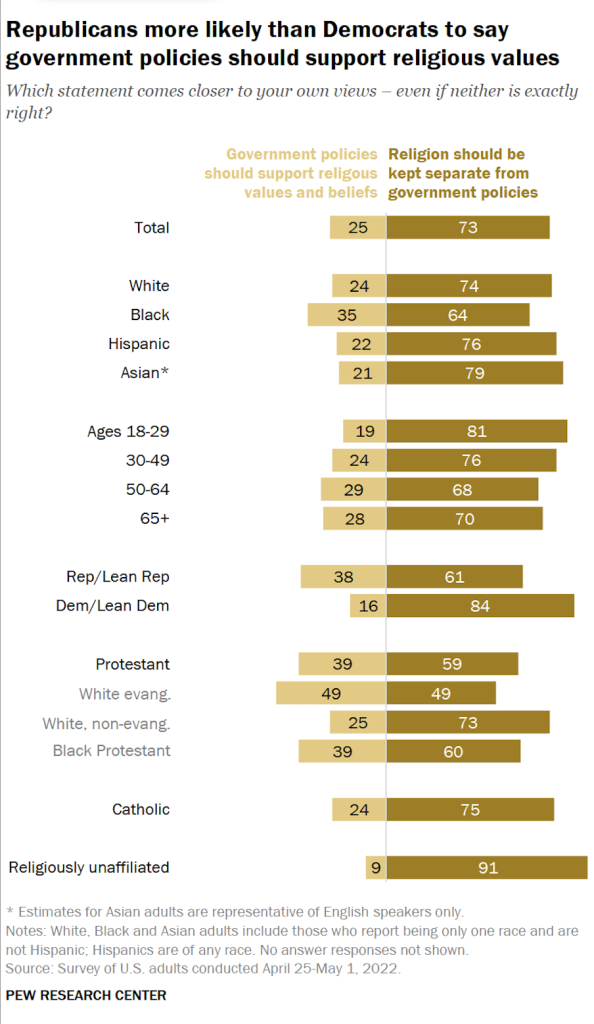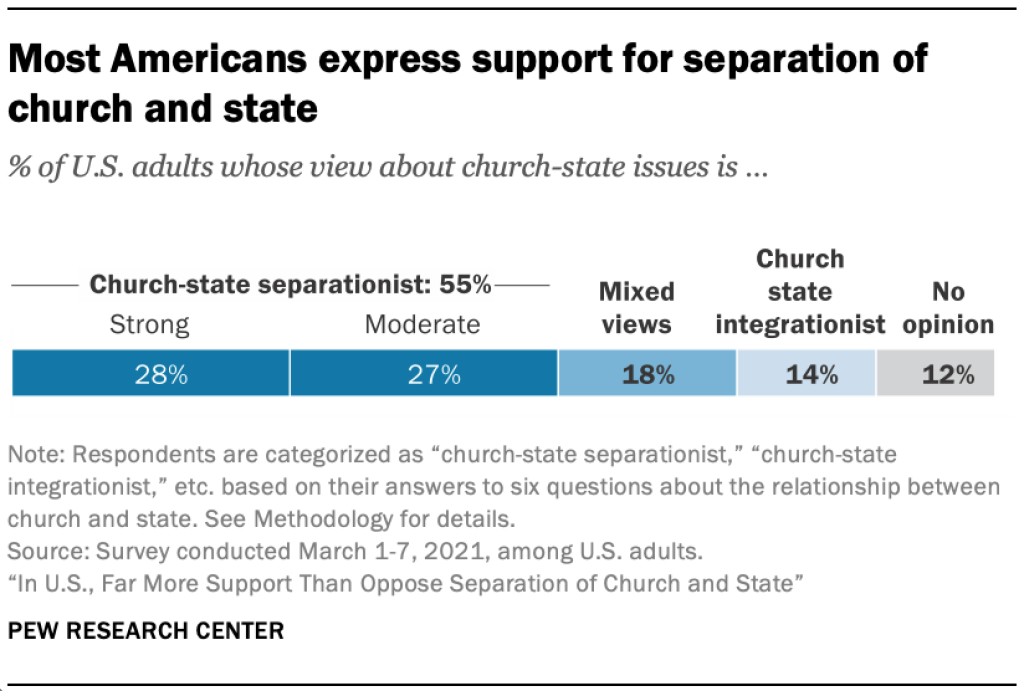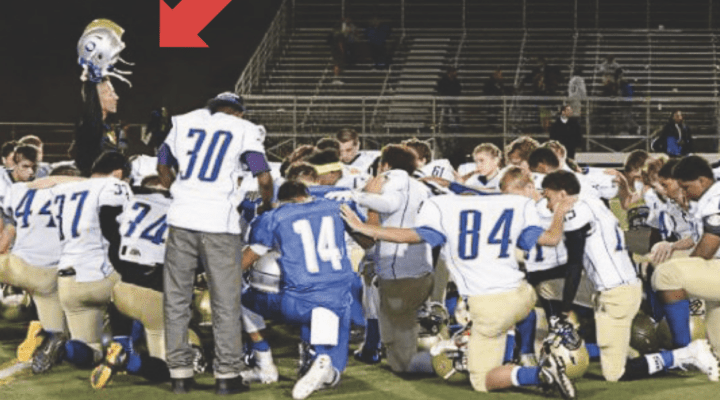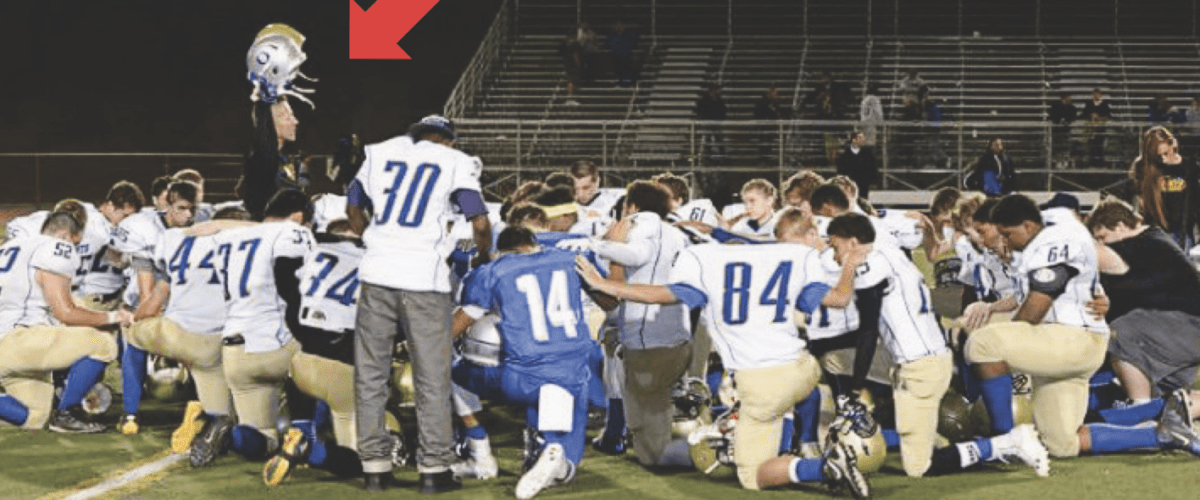Despite recent Supreme Court cases that chopped chinks in the “wall of separation” between church and state, most Americans believe government and religion should butt out of each other’s business, according to polls conducted by the Pew Research Center.
The opening line of the First Amendment states, “Congress shall make no law respecting an establishment of religion, or prohibiting the free exercise thereof ….” In a Jan. 1, 1802, letter to the Danbury Baptist Association in Connecticut, Thomas Jefferson explained the implementation of those words should result in “building a wall of separation between Church & State.”
However, conservatives increasingly have chafed at Jefferson’s “wall of separation” metaphor. They have been seeking to upend generations of legal interpretations that prevent government from “establishment of religion” — which consistently has meant keeping government from enacting laws and regulations that either sponsor or favor religion.
(Side note about “conservative”: This word has lost its meaning in American politics. Literally, a conservative seeks to preserve tradition, precedent and historical understanding. Increasingly, people who embrace the term — including the Supreme Court’s six-justice majority — seek to undo precedent and redefine the law to their liking.)
In the term that ended this summer, the Supreme Court issued two 6-3 rulings that knocked gaping holes in Jefferson’s “wall of separation.”
Kennedy v. Bremerton and Carson v. Makin overturned decades of historic precedent — seemingly settled legal understandings that forbade teacher-led prayer in public schools and taxpayer funding of religious schools.
In Kennedy v. Bremerton, the court’s majority reversed lower-court rulings and sided with an assistant high school football coach who was suspended for refusing to stop holding Christian prayer sessions on the 50-yard line immediately after games.
In Carson v. Makin, the same majority ruled the state of Maine cannot exclude religious schools from participating in a program that has provided tuition to private non-sectarian schools in communities that do not have public schools.
These rulings overturned decades of historic precedent — seemingly settled legal understandings that forbade teacher-led prayer in public schools and taxpayer funding of religious schools.
But in contrast to the Supreme Court’s super-majority that wishes to pull down the wall of separation between church and state, a strong majority of Americans support the long tradition of keeping them separate, the Pew surveys indicate.
 A poll conducted this spring revealed almost three out of four Americans (73%) agreed “religion should be kept separate from government policies.” This contrasts with 25% who think “government policies should support religious values and beliefs.”
A poll conducted this spring revealed almost three out of four Americans (73%) agreed “religion should be kept separate from government policies.” This contrasts with 25% who think “government policies should support religious values and beliefs.”
Interestingly, strong majorities of both major political parties — 61% of Republicans and 84% of Democrats — indicated they affirm keeping religion separate from politics. That said, among those who want government to support religious values and beliefs, the proportion of Republicans (38%) is more than twice as large as the share of Democrats (16%).
Strong majorities of four major racial-ethnic groups likewise favor separation — Asian, 79%; Black, 64%; Hispanic, 76%; and White, 74%.
In general, younger generations support separation more broadly than do their elders — ages 18-29, 81%; ages 30-49, 76%, ages 50-64, 68%; and ages 65 and older, 70%.
From a religious perspective, only White evangelicals are evenly split on separation/government support for religion, with 49% of that group affirming each position.
Otherwise, strong majorities of each group favor separation over government support:
- Protestant — 59% favor separation/39% favor government support
- White nonevangelical — 73% separation/25% support
- Black Protestant — 60% separation/39% support
- Catholic — 75% separation/24% support
- Unaffiliated — 91% separation/9% support
67% of U.S. adults believe “the U.S. Constitution was written by humans and reflects their vision, not necessarily God’s vision.”
Examining a range of related topics, a 2021 Pew Research Center study showed “the clear majority of Americans do not accept” abridgement of the division between church and state. For example:
- 67% of U.S. adults believe “the U.S. Constitution was written by humans and reflects their vision, not necessarily God’s vision.” This contrasts with 18% who think the Constitution was divinely inspired.
- 69% affirmed “the federal government should never declare any religion as (the) official religion of the U.S.” Only 15% said they want the country declared a “Christian nation.”
- A similar majority, 63%, said “the federal government should advocate moral values shared by people of many faiths,” while 13% want the government to support “Christian values.”
The general outliers in the survey were respondents who self-identified as White evangelical and “highly religious Christian.” Majorities of those groups said public school teachers should be allowed to lead Christian prayers (58%/55%) and cities and towns should be allowed to place religious symbols on public property (65%/62%).

But even among those groups, only a minority (34%/31%) agreed the federal government “should stop enforcing separation of church and state.”
Also, although White evangelicals indicated the strongest support for the “church-state integrationist” position of all faith groups and major political parties, barely more than a third (36%) took that position.
Overall, 55% of Americans affirmed a strong (28%) or moderate (27%) “church-state separationist” position, while only 14% of the population affirmed the “integrationist” stance. Meanwhile, 18% said they favor a “mixed” position, and 12% have no opinion.
Baptists who appreciate their heritage can take comfort in the surveys, even as the court undermines religious liberty for all. In “The Bloody Tenent of Persecution for the Cause of Conscience,” Roger Williams, founder of the first Baptist church in America, insisted: “God requireth not an uniformity of religion to be enacted and enforced in any civil state; which enforced uniformity, sooner or later, is the greatest occasion of civil war, ravishing of conscience, persecution of Christ Jesus in his servants and of the hypocrisy and destruction of millions of souls.”
Marv Knox founded Fellowship Southwest after editing the Baptist Standard almost 20 years. Now retired, he lives with his wife, Joanna, in Durham, N.C., where he tries to do something useful almost every day. This week, that’s editing BNG.
Related articles:


